Hamas leader died having failed abysmally
A year after Yahya Sinwar’s October 7 massacre, all he achieved was to damage Israel’s international reputation and spark an ugly revival of anti-Semitism in the West, including in Australia.
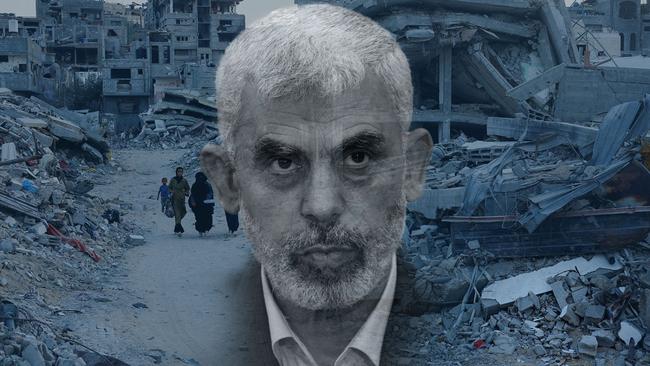
The welcome death of Hamas leader Yahya Sinwar has recast the war in Gaza. His demise offers a critical new opportunity for Israel, Hamas and the West to end the stagnation in Gaza and move forward.
The killing by Israeli troops of the 61-year-old terror leader could not have come at a better time in this conflict. After a year of bloody fighting, Israel has broken the back of Hamas as a viable, coherent military force in Gaza.
But it could never declare victory over Hamas or be confident that the group would not regroup to be a threat while Sinwar remained alive.
By killing Sinwar, Israel has chopped the head off an already broken Hamas and has shaken up the status quo in Gaza militarily, politically and symbolically.
Symbolically, Israel has done the world a huge favour by getting rid of one of the most evil terrorists since Osama bin Laden sent his al-Qa’ida foot soldiers to destroy New York’s World Trade Centre twin towers in 2001.
It was Sinwar who, back in 2021, began actively planning the October 7 massacre of 1200 Israelis. As the Hamas chief in Gaza, he was a hardliner who won an internal battle against more moderate voices within Hamas to guide the group towards violence rather than negotiation.
He told his fellow terror-sponsor Iran that he believed a major attack by Hamas on Israel would lead to the demise of the Jewish state within two years.
Central to Sinwar’s brutal calculation was that Israel would respond with deadly force to any attack by Hamas and that the highly urbanised nature of Gaza would guarantee Israel’s war on Hamas also would kill tens of thousands of civilians, staining Israel’s reputation around the world.
Sinwar did not care about the lives or the future of Palestinians living in Gaza and was happy to see them sacrificed to realise his long-term ambition of destroying Israel.
But he died having failed abysmally in his aims. A year after Sinwar’s massacre, all he achieved was to damage Israel’s international reputation and spark an ugly revival of anti-Semitism in the West, including in Australia.
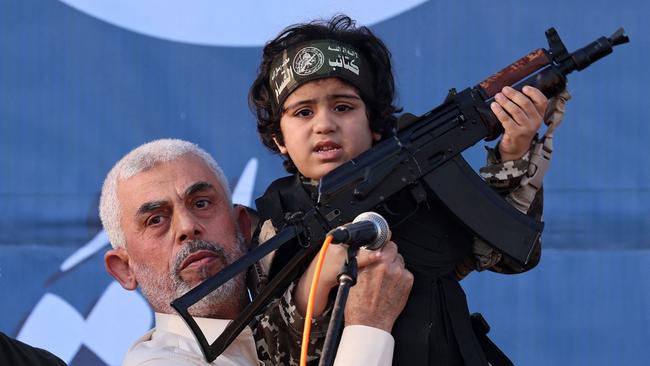
Yet history will record Sinwar as having done more to set back the cause of the Palestinian people and their search for a Palestinian state than anyone this century.
He died having overseen the almost complete destruction of his beloved Hamas as a viable fighting force. This broken group can never again mount a major terror assault on Israel or threaten Israel’s existence. Its military future is limited to that of a guerrilla force, capable of small scale hit-and-run attacks against any occupying Israeli forces but nothing more.
Politically, Sinwar’s actions have ensured that Hamas will never again govern Gaza as it did until October 7. And it will never again play a political role in helping determine outcomes in the West Bank, where the corrupt Palestinian Authority rules.
Sinwar’s miscalculations do not end in Gaza. Hamas’s massacre led Hezbollah in Lebanon to make the foolish decision to launch a continuous low-grade war against northern Israel in solidarity with Hamas.
That tactic has, quite literally, blown up in Hezbollah’s face.
The Iranian-sponsored terror group is on the back foot, having provoked an Israeli ground invasion and a ferocious Israeli assault on its leadership.
This has led to the assassination of long-time Hezbollah leader Hassan Nasrallah and his top deputies, as well as the maiming of thousands of Hezbollah foot soldiers through the detonation of Hezbollah-issued pagers and walkie-talkies.
At the same time, Israel has knocked out many thousands of missiles and drones in Hezbollah’s substantial armoury by waging a relentless air campaign in southern Lebanon.
Hezbollah’s folly in firing a daily barrage of missiles into northern Israel to support Sinwar’s Hamas has led directly to its own severe degradation as a military and as a political force. So far, Hezbollah’s retaliation against Israel has been largely ineffectual.
The damage has been such that what remains of Hezbollah’s leadership is now openly mulling the possibility of a ceasefire rather than a long and bloody confrontation with Israel.
So Sinwar’s madness has not only destroyed Hamas and led to a greatly weakened Hezbollah, it also – by extension – has weakened the hand of the Middle East’s terror puppet master, Iran.
Iran has been stung by the collapse of Hamas in Gaza and the crippling of Hezbollah’s leadership in Lebanon. To save face, it launched two missile attacks against Israel for the first time, but each has failed to cause any significant damage, exposing the limits of Iran’s ability to directly harm Israel.
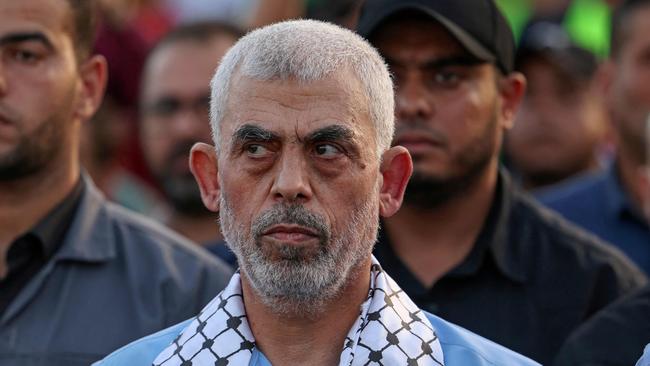
As a result Iran is bracing for a retaliatory strike by Israel, most likely against key military sites, in what is likely to be another embarrassing example of Iran’s vulnerability.
So in life Sinwar failed comprehensively in his aims. But in death he may prove more useful.
It was Sinwar who did more than any other Hamas commander to foil ongoing negotiations for a ceasefire in Gaza, coupled with a deal to release the roughly 60 remaining Israeli hostages in Gaza who are still thought to be alive.
Whenever negotiations appeared close to a breakthrough it was Sinwar who reportedly derailed them from the Hamas side by adding and changing previously agreed conditions.
Sinwar’s death reopens the potential for a ceasefire and hostage deal to be reached, although there is certainly no guarantee of this.
The fate of the hostages has been a recurring nightmare for Israel across this past year. A temporary ceasefire deal in November last year in which more than 100 of the original 251 hostages were released has not been repeated.
Israel Defence Forces troops have managed to free a handful of hostages during fighting in Gaza but the deliberate murder of six hostages by Hamas in August as Israeli troops closed in led Israel to conclude that a political rather than a military solution was needed to save the lives of the remaining hostages. Sinwar had issued orders for his commanders to kill their hostages if under siege by Israeli forces.
Israeli Prime Minister Benjamin Netanyahu has divided opinion in Israel by prioritising the military campaign against Hamas over negotiations for a ceasefire and a release of hostages. He is accused by hostage families of callous indifference to their fate, while right-wing figures in his coalition have pressured him to keep fighting Hamas ahead of agreeing to any ceasefire-hostage deal.
The death of Sinwar could change this calculation in several ways.
First, it will increase political pressure on Netanyahu from the families of the hostages and by war-weary Israelis to use Sinwar’s death to negotiate harder for the hostages’ release.
With Sinwar out of the way, the fate of the remaining hostages will be decided by whoever takes his place, and possibly even by more junior officers from various Islamic jihad groups who are believed to be holding small groups of hostages. Netanyahu has offered an olive branch to these by promising pardons for any militants who surrender their hostages now that Sinwar is dead.
The opportunity to secure the safe release of hostages had been dwindling by the day and Sinwar’s death does not offer those poor hostages a clear road to safety.
But it does offer a glimmer of hope when previously there had been very little.
Yet the fate of the hostages also will be closely bound up with the key decision now facing Netanyahu in the wake of Sinwar’s death – does he keep fighting Hamas, and for how long?
Sinwar’s death gives Netanyahu the political ability to declare that Israel has now destroyed Hamas as a viable and coherent fighting force.
It gives him the opportunity for a political victory march to declare that Israel has achieved its post-October 7 ambition of destroying Hamas.
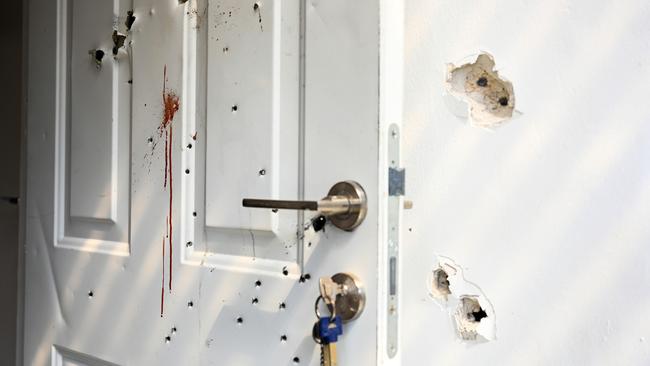
But Netanyahu has already said that more fighting is needed despite Sinwar’s demise.
“Today, evil suffered a severe blow, but the task before us is not yet complete,” he said.
Netanyahu will need to make difficult judgments about the risks and rewards of continuing to pursue a broken Hamas in Gaza.
The reward is that the group is now on its knees, without effective leadership, and that further military action will further degrade its future capabilities. The risk is that Hamas is now a guerrilla force capable of popping up in different places to carry out small-scale attacks.
For Israel to continue to attack Hamas in this state is like playing whack-a-mole, with little overall strategic benefit and the guarantee of more civilian deaths and the loss of more Israeli soldiers.
Much of what unfolds now will depend on the attitude of the leader who replaces Sinwar. Many of Hamas’s key leaders have been killed during the past year and it is unclear among the remaining leadership what the appetite for continued fighting will be.
Sinwar could be succeeded by his deputy in Gaza, Khalil al-Hayya, who has represented Hamas in ceasefire negotiations with Israel, or by former Hamas leader, Khaled Meshaal.
Whoever succeeds him will need to make quick decisions on whether Sinwar’s staunch opposition to a ceasefire-hostage deal is still the best way ahead for what remains of Hamas. Sinwar’s death also may help to kickstart long-overdue discussions about what entity eventually replaces Hamas as the administrator of Gaza once the war ends.
As US National Security Adviser Jake Sullivan said: “His removal from the battlefield does present an opportunity to find a way forward that gets the hostages home, brings the war to an end and brings us to a day after.”
None of this is guaranteed in the cauldron that is the Middle East.
But Sinwar’s death after his historic failure to bring Israel to its knees should be celebrated not just for the removal of an odious tyrant but because of the opportunities it now presents.


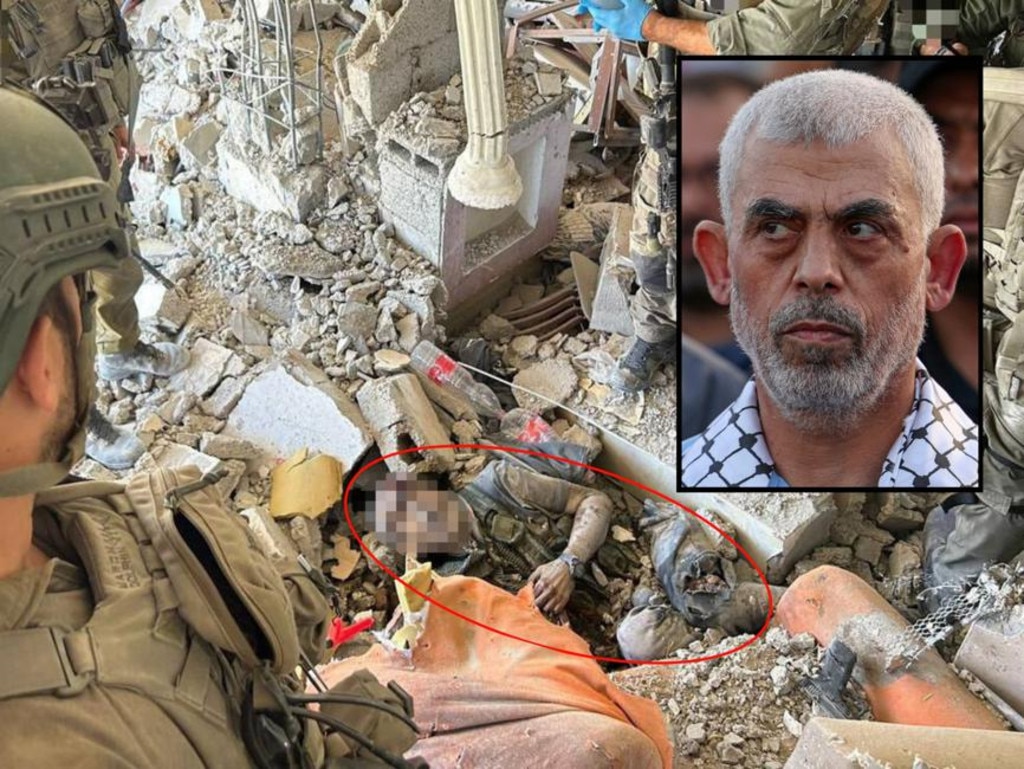

To join the conversation, please log in. Don't have an account? Register
Join the conversation, you are commenting as Logout